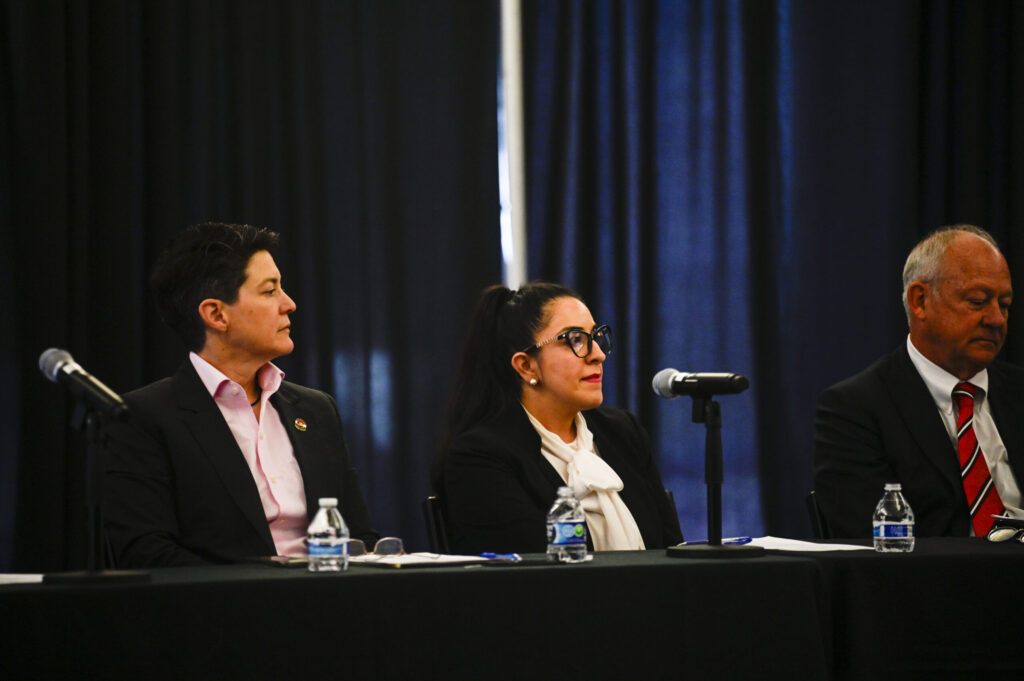Federal judge sends claims of 13 plaintiffs to trial over police response to 2020 demonstrations
A federal judge last week agreed 13 people injured in the police response to 2020 demonstrations in Denver will have their claims of constitutional violations decided by jury trial.
Numerous judges in the past five years have found Denver or its officers may be held liable for excessive force or First Amendment violations in a series of lawsuits. The claims all arose after a Minneapolis police officer killed George Floyd in May 2020, prompting international protests. Denver police, along with other responding agencies, subsequently used force against violent rioters and peaceful protesters.
In a May 23 order, U.S. District Court Judge S. Kato Crews addressed motions from the Denver defendants to end the case in their favor, as well as a motion from the plaintiffs to limit the city’s ability to litigate the adequacy of its training. Crews denied both sets of requests.
On the plaintiffs’ side, the 13 litigants who were injured by chemical weapons, projectiles, flashbang grenades or some combination of those moved to block Denver from arguing its training was sufficient. They invoked the principle of “issue preclusion,” which prevents a party from relitigating an identical issue that has been fully and finally decided elsewhere
In late August, U.S. District Court Senior Judge R. Brooke Jackson entered the final judgment in a similar case involving a different group of protesters. That case, Epps v. City and County of Denver, went to a trial in 2022. A jury awarded the plaintiffs nearly $14 million.
Jackson had held off on closing the case while the parties settled other claims. But the jury in Epps agreed Denver’s failure to train its officers rendered the city liable for First Amendment and excessive force violations.
An “examination of the Epps verdict and jury instructions, as well as the evidence presented at trial, shows that, in finding Denver liable for violation of plaintiffs’ First and Fourth Amendment rights on the failure to train, the jury necessarily decided that Denver failed to train its officers in crowd management and use of less-lethal weapons — which is identical to the issue in this case,” the plaintiffs’ lawyers argued to Crews.
Denver disputed that logic. It pointed out there was nothing to demonstrate what, exactly, the Epps jury believed the training deficiency to be. Jurors could have found the constitutional shortcoming related to use of “less-lethal” weapons, crowd control or something else. Therefore, the issues in the two cases were not identical.
Also, the city continued, if the Epps verdict were overturned on appeal, “the finality of any jury verdict in this matter would be suspect and subject to attack” if Crews found the training issue was linked to the Epps case.
Crews agreed with Denver, concluding the plaintiffs would still need to prove a failure to train led to violations of their constitutional rights.
“While Plaintiffs here cite various testimony presented in Epps regarding deficiencies in Denver’s training or supervision of its officers, they do not (nor can they) identify the specific deficiencies the jury found,” he wrote.
Denver, on the other hand, moved to end all claims in its favor without a trial. The city argued the police response was reasonable given the violence in the crowds, and the plaintiffs who were violating a curfew could not prove the force used against them was retaliation for exercising their free speech rights.
The city further argued that the use of chemical agents to disperse crowds was not a constitutional violation. It cited a 2024 decision from U.S. District Court Judge Nina Y. Wang in a different protest case, where she wrote that “no reasonable jury” could find a violation from the use of chemical weapons alone.
Crews, however, pointed to his own decision in yet another protest case several months after Wang’s, where he concluded the deployment of chemicals on crowds could sustain an excessive force claim.
“The same conclusion applies here,” he wrote in his latest order.
Crews also noted there were sufficient disputes over the facts to prevent Denver from prevailing outright, and a jury trial was necessary to determine the peaceful or violent conduct of the plaintiffs, the timing of officers’ use of less-lethal weapons, and who the munitions and chemical agents were aimed at.
He also declined to grant immunity to incident commander Patrick Phelan, who the plaintiffs alleged to have personally directed or authorized the actions that violated their rights.
Crews indicated he will schedule a jury trial for later this year.
The case is Dominick et al. v. City and County of Denver et al.
Colorado Politics Must-Reads:













